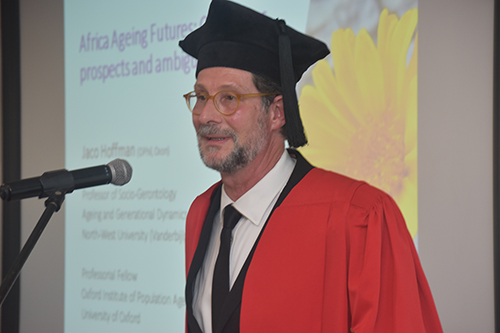Africa is and will be the continent with the youngest population globally for the foreseeable future. In the meantime, many more people in Africa are living increasingly longer.
This finding is based on demographic trends on the continent and raises a host of complex issues for policymakers, according to Prof Jaco Hoffman, a professor of Socio-Gerontology in the Optentia research unit at the North-West University’s (NWU’s) Vanderbijlpark Campus.
Socio-gerontology is the interdisciplinary study of the social aspects of ageing and Prof Hoffman is the first professor in this field at the university.
In his inaugural lecture, titled "Africa ageing futures: Challenges, prospects, and ambiguities", he explored the complexities around the biological, psychological, social and public policy aspects of ageing and the implications of ageing for the future with respect to the levels of research, policy development and practice.
In his lecture he drew on the innovative work of Osborne Macharia, a self-taught Kenyan commercial photographer and digital artist. Osborne's work focuses on themes of Afrofuturism through which he challenges stereotypes and (re)imagines Africa's future through images, storytelling and social inclusion.
Pointing out that around 75 million people in Africa are currently aged 60 and above, Prof Hoffman said this will almost quadruple to around 235 million by 2050. The rise in the number of older people in Africa, specifically in sub-Saharan Africa, will be sharper than for any other region and age group.
"These transitions occur largely against the backdrop of poverty and inequalities, migration and the quadruple disease burden and are cross-cut by changing family dynamics. Despite this, Africa will remain the youngest continent in the world population-wise," he said.
Invest in the young and the old
The implication of these trends is that it makes developmental sense to adopt equitable, intergenerational and life-course approaches. This means treasuring “linked lives” through investments in both the young and the old.
The overlap in the rise in non-communicable diseases and increasing longevity will have an enormous socio-economic impact on Africa, said Prof Hoffman, noting that this necessitated concurrent investments in older and younger generations.
“Already there is a clear and increasingly acknowledged need for a range of Africa-appropriate long-term care options as the older population increases. Simultaneously, the high burden of youth unemployment throughout Africa calls for older people's long-term social and healthcare needs to be linked with broader development agendas.”
This raised two important and interrelated questions. For one, could the health needs of an increasingly ageing population offer opportunities for inclusive economic growth, job creation and greater economic stability? Second, how could long-term care for older adults in need provide employment opportunities for younger generations and decent work for women?
“Such anticipated and emergent intergenerational futures could then address the growing demand for expanding formal service provision needs and contribute to the widening of employment opportunities for Africa's youth,” he said.
“It could also embrace gender equality, decent work and women's empowerment by investing in training to reach the under-served. In this way, the formal care economy – with older people as part of the equation – could strengthen African efforts to establish the conditions needed to develop a society for all ages.”
Click here to find out more about the study.
Watch as Prof Hoffman discusses Africa Ageing Futures: Challenges, Prospects and Ambiguities.

Prof Jaco Hoffman.
